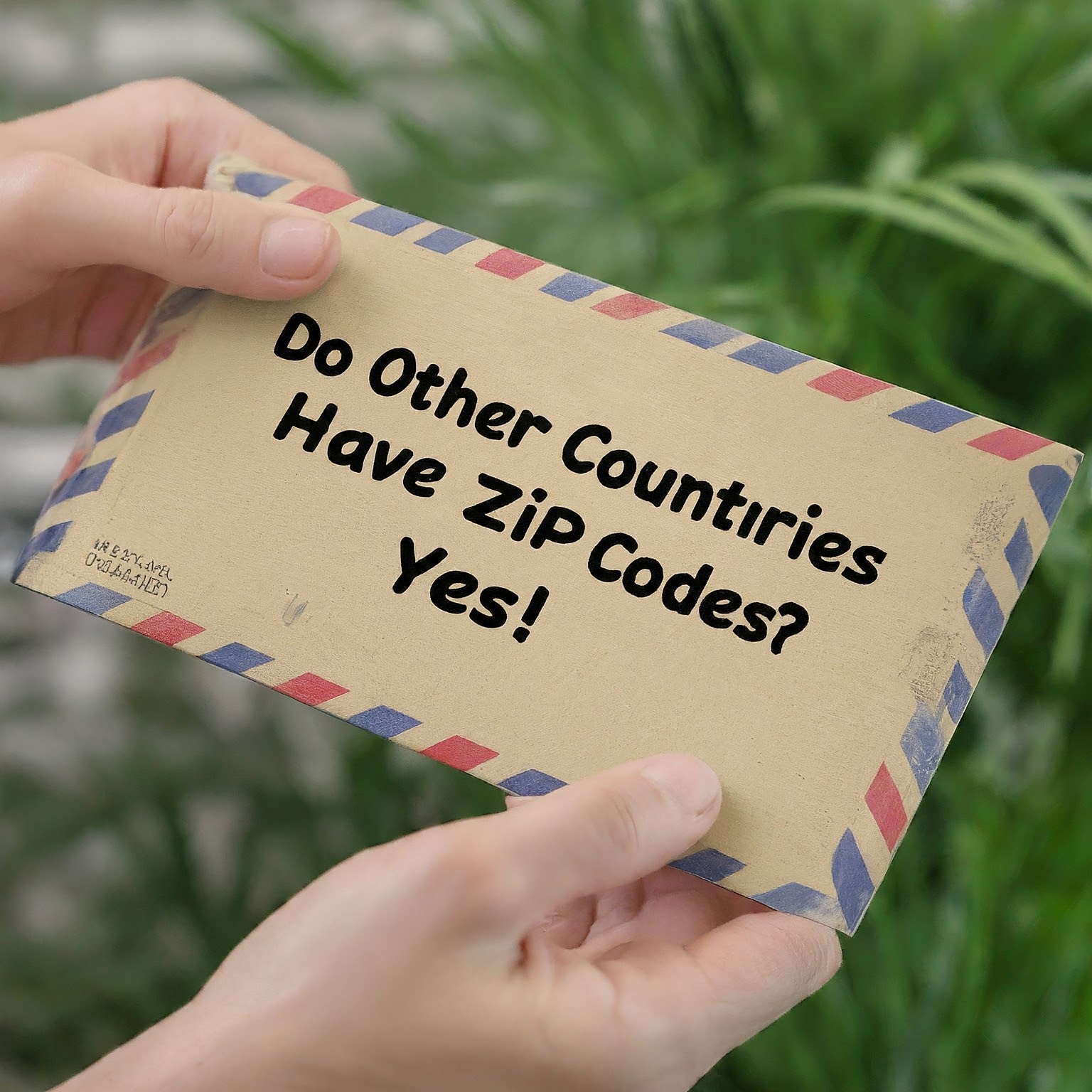Do other countries have zip codes? The answer is a resounding yes, but with a twist. While the term “zip code” is specific to the United States, most countries around the world have their own systems of postal codes designed to streamline mail delivery and enhance efficiency. These codes, however, go by different names and vary in structure and implementation. Let’s embark on a journey across continents to explore the diverse world of postal codes and their role in facilitating global communication.

Zip Codes: A Uniquely American Term
The term “zip code” is an acronym for Zone Improvement Plan code and was introduced by the United States Postal Service (USPS) in 1963. These five-digit codes revolutionized mail sorting and delivery, making it easier to identify and route mail to specific locations. The concept of assigning numerical codes to geographic areas for postal purposes, however, is not exclusive to the United States.
Postal Codes Around the World
While the term “zip code” is American, similar systems exist in nearly every country with a formal postal service. These codes are often referred to as:
- Postal Codes: This is the most common term used internationally.
- Postcodes: Primarily used in the United Kingdom and other Commonwealth countries.
- PIN Codes: Short for Postal Index Number, used in India.
- CAP Codes: Stands for Codice di Avviamento Postale, used in Italy.
- Eircodes: The official name for postal codes in Ireland.
Each country has its own unique format and structure for postal codes, reflecting its geographic divisions, population density, and cultural context.
A Global Perspective: Postal Codes Across Continents
Let’s take a closer look at how postal codes are used in different regions of the world:
North America
- United States: The five-digit zip code system is widely used and recognized, with optional ZIP+4 codes providing even greater precision.
- Canada: Canada uses a six-character alphanumeric postal code, with alternating letters and numbers (e.g., A1A 1A1).
Europe
- United Kingdom: UK postcodes consist of five to seven alphanumeric characters, with a space or hyphen separating the outward and inward codes.
- France: French postal codes are five-digit numbers, representing departments and communes.
- Germany: German postal codes are five-digit numbers, with the first two digits representing a broader region and the last three digits identifying a specific locality.
Asia
- India: India uses a six-digit PIN code system, with the first digit representing a region and the remaining digits indicating a specific post office.
- China: China’s postal codes are six-digit numbers, often corresponding to administrative divisions.
- Japan: Japan uses a seven-digit postal code system, with the first three digits representing a prefecture and the remaining four digits identifying a specific area within the prefecture.
Other Regions
- Australia: Australia uses a four-digit postcode system, with the first digit indicating a state or territory.
- South Africa: South Africa uses a four-digit postal code system.
- Brazil: Brazil uses an eight-digit CEP (Código de Endereçamento Postal) system.
Why Do Other Countries Have Zip Codes?
The reasons for implementing postal codes are similar across countries:
- Efficiency: Postal codes streamline mail sorting and delivery, reducing errors and speeding up the process.
- Accuracy: They help ensure that mail reaches the intended recipient, even in areas with similar street names or complex addresses.
- Planning and Resource Allocation: Postal codes provide valuable data for planning infrastructure, allocating resources, and analyzing demographic trends.
- Emergency Services: They assist emergency services in quickly locating addresses, which can be crucial in life-or-death situations.
Do All Countries Have Postal Codes?
While most countries have some form of postal code system, there are exceptions. Some smaller countries or territories may not have a need for such a system due to their size or population density.
Countries Without Postal Codes
Some countries that currently do not use postal codes include:
- Panama
- Eritrea
- Ireland (prior to 2015)
However, even in these countries, there are often alternative addressing systems in place to ensure accurate mail delivery.
The Future of Postal Codes in a Digital Age
While postal codes remain essential for traditional mail delivery, the rise of digital communication and e-commerce is transforming the way we address and send information.
Digital Addressing Systems
Digital addressing systems, such as what3words, are emerging as alternatives to traditional addresses. These systems divide the world into 3-meter squares, each with a unique three-word address. This can be particularly useful in areas with informal or non-existent addresses.
QR Codes and Geolocation
The use of QR codes and geolocation technology is also becoming more common in addressing and delivery. These technologies allow for precise location identification, even in remote or rural areas.
The Role of Postal Codes
While new technologies are changing the way we address and send information, postal codes are likely to remain relevant for the foreseeable future. They provide a standardized system for identifying locations, which is essential for mail delivery, emergency services, and various other applications.
Conclusion: A Global Network of Postal Codes
The question of “do other countries have zip codes” reveals a fascinating world of postal code diversity and innovation. While the term “zip code” may be unique to the United States, the concept of using codes to streamline mail delivery is universal.
From the alphanumeric codes of Canada and the UK to the numeric codes of France and Germany, each country has developed a system that best suits its needs. As technology continues to evolve, postal codes will likely adapt and integrate with new addressing methods, ensuring that mail and information reach their intended destinations efficiently and accurately.
Read Also: The Curious Case of the 88888 ZIP Code: Fact or Fantasy